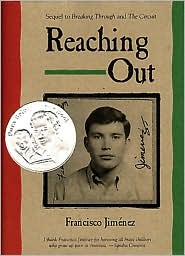
Reaching Out
Written by Francisco Jiménez
Houghton Mifflin, 2008, 208 pp.
ISBN: 978-0-618-03851-0
The first person narrator of Reaching Out is Francisco Jiménez, who realistically recounts his experiences as an underprivileged undergraduate student in this sequel to his two other memoirs, The Circuit (1999) and Breaking Through (2002). With the same clarity used in these previous books, Jiménez begins this autobiography by reminding readers of his close relationship to his family and introducing the internal conflicts that drive the decisions he makes throughout the novel–the need to reach out from the poverty and backbreaking work of his childhood and the extreme guilt and sadness of leaving behind the family that needs him.
Other conflicts are explored as Jiménez takes the reader from his family’s dilapidated migrant farm camp to the beautiful gardens and buildings on the campus of Santa Clara University. The juxtaposition of this setting reflects how drastically Francisco’s life has changed from when readers first met him through the stories of his childhood in a migrant family to his first year as a first-generation college student. Jiménez reminds the reader of his long hours of hard work as a janitor and diligent studying as a high school student that made his university opportunity possible, but he also portrays how under-prepared he felt for life at the university. Jiménez does not seem to exaggerate or try to evoke sympathy from the reader with these stories; he simply describes the changes in his world in an honest way. Just as in his other works, Jiménez makes the reader see and feel with him.
The action of the story builds to the climax, where Francisco’s internal conflicts of guilt are intensified. When he learns that his father has suffered a nervous breakdown and returned to Mexico, Francisco feels a heightened sense of guilt for not putting the needs of his family first. His worry for the welfare of his family overwhelms him, and he contemplates leaving the university to ensure the well-being of his mother and brothers and sister. The way this major conflict is addressed and resolved creates suspense for the reader who remembers Francisco being held back in the first grade for not being able to speak English and hopes for his success in completing his bachelor’s degree.
Jiménez infuses this story of his early adult years with memories of his childhood and the themes of extreme poverty experienced by his family and other migrant farm-working families. In doing so, he realistically portrays the poor conditions of his family’s life, but avoids stereotypes by not generalizing poverty across the entire Mexican-American culture. While some of Francisco’s problems seem to be solved by Anglo-Americans, it is his own resilience, perseverance, self-reflection, and genuine good-nature that help him resolve the conflicts he faces. The range and complexity of these conflicts are depicted authentically and not handled superficially. Authentic aspects of Mexican and Mexican-American culture represented in Jiménez’s novel include the importance of religion and family, mutual cooperation within the family as each member contributes to the family’s welfare, respect for elderly members of the family, the expectation that children be respectful, the rewarding of cleverness and sharing, and the punishing of greed and evil actions. The natural use of the Spanish language in the story also enhances the cultural authenticity of the text. The book’s translation pattern effectively integrates the use of Spanish in conversations. Most of the Spanish is literally translated, but a monolingual reader is able to use the context of the story to infer or predict the meaning of the words that are not translated. Because Jiménez has both academic and life knowledge of the Spanish language, the reader trusts that the language was used correctly by this bilingual author.
Jiménez retells his experiences in a genuine, simple voice, without excess sentimentality; however, this does not keep the reader from feeling his pain and pride and holding hope in our hearts for his success. Reaching Out is an honest, well-crafted memoir, deserving of its 2009 Pura Belpré honor as a book that “portrays, affirms, and celebrates the Latino cultural experience.” The story can be read alone or as part of a series of Jiménez’s other notable books, including The Circuit: Stories from the Life of a Migrant Child (1999), Breaking Through (2002), and La Mariposa (2000).
Ashley Faulk, Maxwell Middle School, Tucson, AZ
Cindy Hawk, University of Arizona, Tucson, AZ
WOW Review, Volume I, Issue 4 by Worlds of Words is licensed under a Creative Commons Attribution-NonCommercial-ShareAlike 4.0 International License. Based on work at https://wowlit.org/on-line-publications/review/i-4/

2 thoughts on “WOW Review Volume I Issue 4”
Comments are closed.